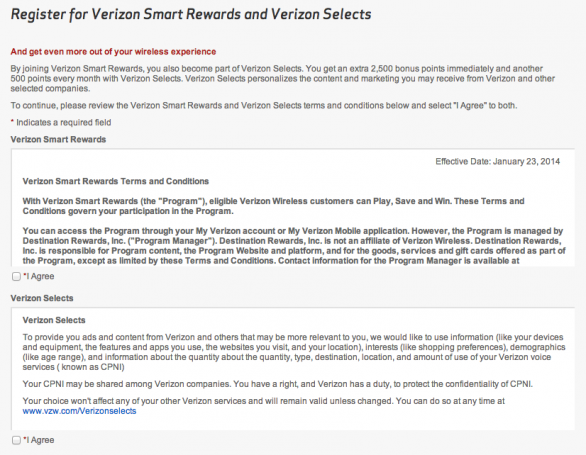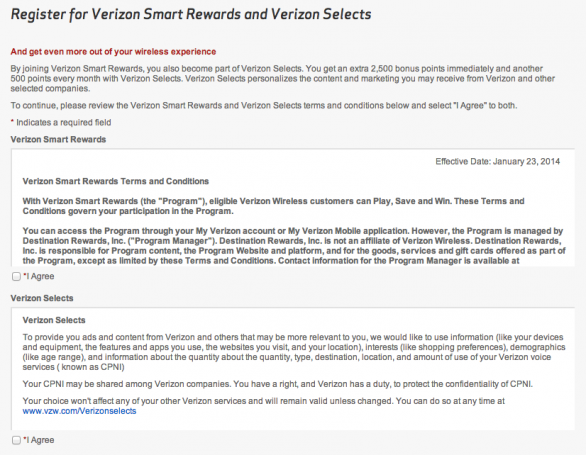The data brokerage game is beefing up, and Verizon just made a massive push to secure its top dog status on the big data radar. With more than 1 million customers, Verizon Wireless is the leading wireless carrier in the United States, ahead of competitors AT&T, Sprint and T-Mobile. For U.S.
The data brokerage game is beefing up, and Verizon just made a massive push to secure its top dog status on the big data radar. With more than 1 million customers, Verizon Wireless is the leading wireless carrier in the United States, ahead of competitors AT&T, Sprint and T-Mobile. For U.S. markets, that puts some serious consumer intel power into the hands of Verizon, and they want to share – er, sell – that intel to the highest bidder.
Much like Facebook’s power data play through which companies can target niche segments of Facebook’s audience based on Facebook-defined segments, theoretically increasing conversions, Verizon’s Verizon Selects program seeks to collect additional consumer data, with consumer permission, and offer that data to companies for hyper-targeted advertising. So far, so good, right?
The Verizon Selects program, on its own, is in fact a solid step toward data collection and use transparency . Customers can opt in to the program and are informed about the differentiated experience that will occur as a result: i.e. more relevant advertising in exchange for your location data, web browsing data, mobile application usage data and more.
Click here to see Verizon’s video explanation of the Verizon Selects program.
The Verizon Selects program, though, launched in 2012, doesn’t seem to have drawn too many consumers in, up-front messaging and all. As a result, on Tuesday, Verizon launched Verizon Smart Rewards, a loyalty program that rewards customers with discounts for meals, events, etcetera for keeping up-to-date contact information, paying bills on time and more. Think of it like a Verizon sponsored Groupon campaign.
The catch? In order to use Smart Rewards, Verizon customers must also opt-in to Verizon Selects.
Click here to see Verizon’s video explanation of the Verizon Smart Rewards program.
This catch-22, of sorts, has Verizon toeing the line between data collection and use transparency and consumer manipulation – and it has some tech journalists up in arms.
Most of us don’t like being tracked while we browse, so #Verizon Wireless is offering subscribers rewards for the intrusion. #technews
— Vanessa Coria 13News (@13VanessaCoria) July 22, 2014
.@Verizon Rewards Customers for Their Data — for other stuff, but really it’s about the data: http://t.co/SvqYHPqA61 via @Light_Reading
— Sarah Reedy (@SReedy) July 21, 2014
Indeed, Verizon’s Smart Rewards program is the first of its kind for a mobile carrier. However, digital platforms like Facebook, Google and the like have been carrying out a very similar campaign for years: a free service that offers users real personal benefit in exchange for said user’s behavioral data. The difference here is that Verizon Selects will collect location data, potentially serving as a competitor for beacon technology as it concerns “smart” brick-and-mortar shopping experiences.
None of these initial implications are upsetting. Instead, the problem is in Verizon’s need to force users to sign up for such a tracking program through a rewards program.

Supporters of the push say this is a win for customers, the exchange of valuable offers for their data, rather than simply the collection of it for company-only benefit. Naysayers, however, point out that the reported value of the Verizon Selects program is in the relevant ad experience [see Verizon’s Verizon Selects video], and that users signing up for the Verizon Selects program via the Verizon Smart Rewards program are not being fully informed of the data collection and use strategies. Instead, some claim, customers will be tricked into the data exchange.
Proper Data Rights Management
When it comes to data collection and use, transparency is key. The world of big data is still a Wild West, if you will, and it is essential that we follow a Golden Rule mantra in which the data of others is treated in the same way you would want yours treated. In order to follow proper big data ethics, the following is necessary:
- Proper Notification: the timely and relevant explaining to users on company data collection and use policies and strategies
- Personal Agency: the allowing of users to opt-out of such collection and use, if they so choose
- Internal Review: the short and long-term assessment of actual data collection and use, ensuring it remains in accordance with the user notification issued at time of collection
With the Verizon Smart Rewards program, Verizon is essentially masking personal agency and forgoing internal review. The breach here is not massive, but in the evolving data rights world, every inch taken now will be reaped by individuals in the future. The big data transparency tactics used today will become those of federal law tomorrow. After all, keep in mind that the White House is currently spending $200 million on big data collection and use research in order to issue proper policies.
The ethical boundaries by which we hold ourselves need to abide by the three guidelines above. And Verizon would be smart to eliminate the absolute need for customers wanting to participate in the Smart Rewards program to also sign up for Verizon Selects. The trust of their customer base may ultimately depend on it.
–
Editor’s note (7/25/2014): An original version of this post mistakenly stated that Verizon does not allow users to opt out of Verizon’s Selects program. The program is optional and customers do have the option to enroll or opt out at any time. Here’s more information:
Verizon Selects Management Options
Though you are required to enroll in Verizon Selects in order to sign-up for Smart Rewards, both programs are voluntary and customers can manage their privacy settings and the amount of data they share through their Verizon account under “manage my account settings.” They can also change their settings at any time, or opt-out of the Verizon Selects program altogether through this link, which provides information about Verizon’s commitment to protecting customers privacy.







